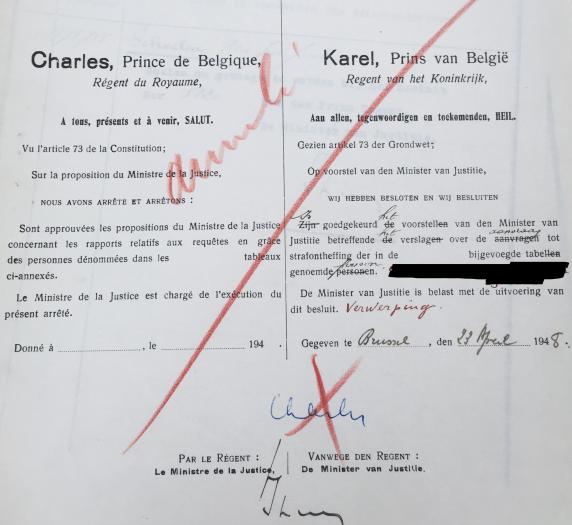Military justice and executions in the context of post-World War II repression in Belgium: the results of the Postwarex research project
Afternoon study session

After World War II, 242 people who were sentenced to death by military courts for collaboration or war crimes were executed. This was an exceptional episode in the history of Belgian justice. Indeed, the death penalty was no longer enforced after 1950 and, with the exception of a few military personnel and suspected spies during World War I, it had been customary for the head of state to grant pardons to those condemned to death since 1863.
This group of 242, and certainly some emblematic figures, such as Irma Laplasse, José Streel or Leo Vindevogel, has already been the subject of research, but mainly from the point of view of pardon policy. The military justice system, a key element in the process leading up to execution, has often remained in the shadows.
This system played an essential role in these executions: the military courts handed down death sentences and the auditorate-general the Chief Military Prosecutor’s Office gave advice on the commutation or rejection of a pardon to the minister of justice.
As part of the BRAIN 2.0 research project "Postwarex", the State Archives/CegeSoma and the Royal Military Academy have collaborated for two years on a research project examining the military justice archives. This project is currently in its final phase. During this afternoon study session, you will discover what the research uncovered on the role of the military justice system.
Program
Chair: Xavier Rousseaux (Université catholique de Louvain)
- 1.30 pm - 1.35 pm : Welcome – Nico Wouters (State Archives/CegeSoma)
- 1.35 pm - 1.45 pm : Het project Postwarex – voorstelling en historiografisch kader – Dirk Luyten (State Archives/CegeSoma)
- 1.45 pm - 2.05 pm : Les exécutions au cours de l’histoire de la justice belge – Stanislas Horvat (École Royale Militaire)
- 2.05 pm - 2. 20 pm : Bronnen voor de studie van de doodstraf – Dimitri Roden (Koninklijke Militaire School – War Heritage Institute)
- 2.20 pm - 2.35 pm : De gefusilleerden : een robotfoto – Dimitri Roden (Koninklijke Militaire School – War Heritage Institute)
- 2.35 pm - 2.55 pm : Le rôle des parquets militaires dans la procédure de grâce – Élise Rezsöhazy (State Archives/CegeSoma)
- 2.55 pm - 3.30 pm : Discussion & coffee break
- 3.30 pm - 3.50 pm : La justice militaire et les exécutions capitales – Élise Rezsöhazy (State Archives/CegeSoma)
- 3.50 pm - 4.10 pm : Cases – Dimitri Roden (Koninklijke Militaire School – War Heritage Institute)
- 4.10 pm- 4.30 pm : Discussion
- 4.30 pm : Closing remarks
